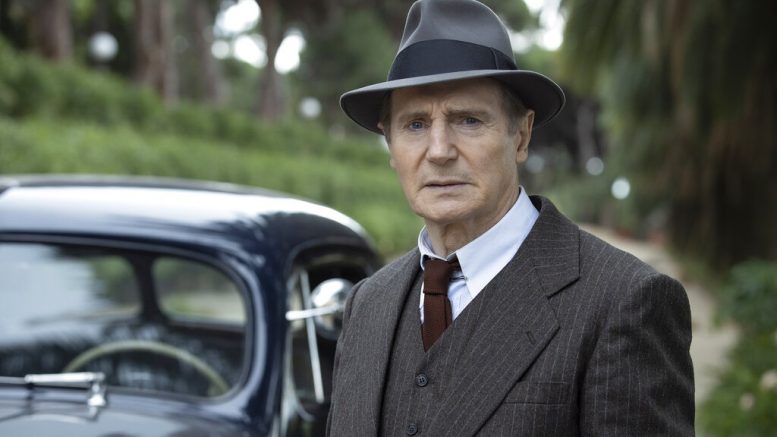The Associated Press
The richly hard-boiled terrain of detective Philip Marlowe has always been, to quote Raymond Chandler, “a nice neighborhood to have bad habits in.”
Chandler’s Los Angeles gumshoe has stretched across some of the most fertile decades of American cinema, from Howard Hawks’ seductively cryptic “The Big Sleep” (1946) to Robert Altman’s “The Long Goodbye” (1973). Having been played by Humphrey Bogart, Dick Powell, Robert Mitchum and Elliot Gould, among others, he’s less a character than a legacy to be passed down, like a cherished dark fedora.
But it’s been a long time, almost half a century, since Marlowe was notably portrayed on the big screen. “Marlowe,” with Liam Neeson as the private eye, is a reclamation project, a bid to recapture some old-school, tough-talking movie magic. And, intriguingly, “Marlowe” is not taken directly from Chandler. It’s instead an original (albeit deeply faithful) interpretation of the character penned by William Monahan (screenwriter of “The Departed”), adapted from John Banville’s 2014 book, “The Black-Eyed Blonde: A Philip Marlowe Novel.”
The urge for imitation is an understandably strong one. Who wouldn’t want to write sentences like: “She gave me a smile I could feel in my hip pocket.” And “Marlowe” seemingly has all the requisite trappings. Venetian blinds. Femme fatales. The sinister underbelly of polite society. So why does — to paraphrase Chandler again — “Marlowe” mostly just kill time and die hard?
The film, which opens Friday in theaters, is a handsomely made period piece crafted with obvious affection for film noir by the veteran director Neil Jordan (“The Crying Game”), plus a top flight cast including Neeson, Diane Kruger, Jessica Lange, Danny Huston and Alan Cumming. Yet “Marlowe,” enveloped with a strong smell of mothballs, feels like an old pinstripe suit that’s been taken out of the closet for no apparent reason. Neeson’s Marlowe punches harder, but that’s about all that distinguishes the film, which has made surprisingly little effort to reconsider Marlowe from a new perspective. Marlowe feels more like a mummy purposelessly raised from the dead.
The year is 1939, which happens to be when Chandler’s flatfoot debuted on the page, in “The Big Sleep.” We’re back in early Los Angeles, a still deeply intoxicating moment in pre-freeway California. Unfortunately, as delicious as some settings here can be — iced tea sipping on a veranda, a lush neon-signed nightclub — “Marlowe” was largely shot in Dublin and Barcelona, robbing the tale of possibly its most important character: Los Angeles.
Like countless private eye tales before it, “Marlowe” opens with a mysterious woman — Clare Cavendish, an Irish-American heiress — enlisting a detective (Marlowe, naturally) for a job. She wants him to find her lost lover (François Arnaud), a search that leads Marlowe to an exclusive members’ club that has some very vicious things going on behind closed doors. It’s overseen by the wide-smiling Floyd Hanson (a brightly brutish Huston), whose toothy grin barely disguises his underlying menace. Like Marlowe, he’s a veteran of the war, and if anything sticks in this stale tale, it’s the way he shrugs off past horrors while carrying them into daily life. “We’re alive and others are not, and it’s a pleasant morning,” he neatly summarizes to Marlowe.
What else works? Lange gets a few fine scenes as Cavendish’s mother, Dorothy Quincannon, a former Hollywood star whose daughter was played in the papers as her niece, so as not to age her. There are some hints of a potentially absorbing mother-daughter femme fatale twist. But “Marlowe” lacks both a meaningful mystery for Marlowe or a narrative as lusciously oblique as “The Big Sleep.” There are some decent stabs at visual poetry by cinematographer Xavi Gimenez but they blend into the film’s sepia wash of yellow. The language occasionally pops — Cumming’s gangster quotes from “The Elements of Style” — but those attempts feel forced.
And as much as Neeson might seem to have the special set of skills required to play Marlowe, his detective feels hollow and maybe a little too tired. Neeson can be a man of rugged force on screen, of course, but his thin growl is less suited to hard-boiled poetry than you would think. No, the best Marlowe is still the first: Dick Powell in 1944’s “Murder, My Sweet,” adapted from Chandler’s “Farewell, My Lovely.” It takes a droller detective to make Marlowe sing in lines like: “I caught the blackjack right behind my ear. A black pool opened up at my feet. I dived in. It had no bottom. I felt pretty good — like an amputated leg.”
“Marlowe,” a Briarcliff Entertainment release, is rated R by the Motion Picture Association for language, violent content, some sexual material and brief drug use. Running time: 110 minutes. Two stars out of four.




































